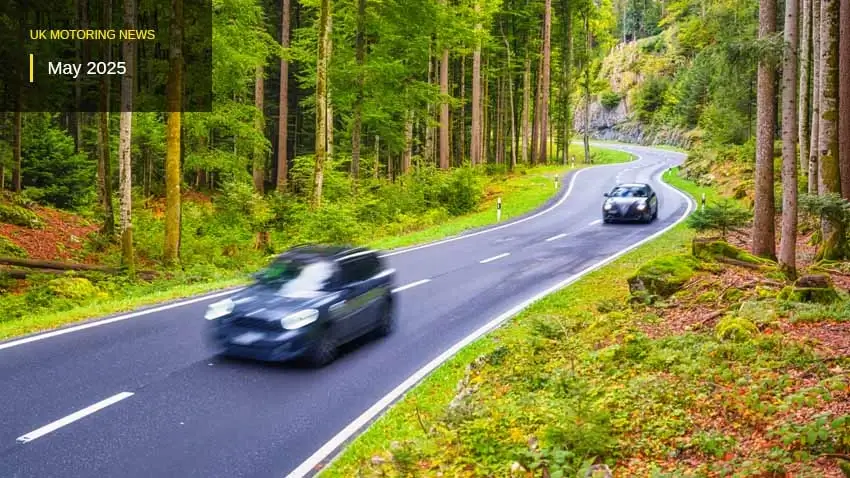Herefordshire's bad drivers shopped by dashcam
A scheme operating in Herefordshire has seen police take action against more than 200 drivers after other road users submitted footage of their transgressions.
West Mercia Police's Operation Snap encourages drivers and cyclists to send in their dashcam and helmet-cam footage to assist in identifying drivers whose dangerous and inconsiderate driving may present a hazard to others.
A police spokesman said that between 300 and 600 videos were shared with West Mercia Police in the period July 2024 to February 2025. 365 of those submitted videos were in Herefordshire, and 242 resulted in police taking some kind of action.
Spokesman Robert Haynes said that the operation would also target motorcyclists, as they also generated a lot of complaints.
EV charging not easily accessible to many disabled people, report finds
A parliamentary report by the Public Accounts Committee has claimed that none of the UK's 15,000 rapid and ultra-rapid EV charging points is compliant with BSI PAS 1899, the standard designed to ensure that charge points are as accessible and usable as possible for disabled people.
One passage in the report stated:
By 2035, 1.35 million drivers with disabilities are expected to be partially or wholly dependent on public charge points, but many charge points, or their surrounding environment, have features which make them inaccessible.
The Motability Foundation, which has been pushing for BSI PAS 1899 to be made a legal standard, commented it wasn't able to verify the claim that no charge points comply with the BSI PAS 1899, but it did confirm that the number of compliant points was low.
Another point of concern regarding the UK's EV charging network that was raised by the Public Accounts Committee's report was the fact that only a third of the UK’s 117 motorway service stations had met the DfT’s target of six or more ultra-rapid chargers.
Legal loophole permits scrap tyres to be burnt overseas
The British Tyre Manufacturers’ Association (BTMA) has called for the government to close legal loopholes that have permitted used tyres to shipped to India where they are burnt..
The head of the BTMA, Darren Lindsey, who leads the British Tyre Manufacturers’ Association (BTMA) named the "T8 exemption" as the culprit and said that the government should introduce stricter controls and traceability measures.
In addition to pressure from the tyre industry trade body, the government has faced similar demands from former environment secretary George Eustice.
Speaking in September 2024, Mr Eustice said, “[...] The government must establish a regulatory regime that supports and rewards those who do the right thing.
“It has long been recognised that the current T8 exemption from the need for a full permit for tyre recovery has been abused. People can self-declare and register for the exemption, renewed every three years and there is little or no enforcement of the conditions of the exemption."
Official figures state that 50 million tyres are sent to waste every year in the UK, and around half of those are exported.
T8 exemption was originally put in place to allow low-risk operators to process up to 40 tonnes of waste passenger car tyres per week without having to apply for a stricter environmental permit.
T8 intends that waste tyres should be baled, shredded and granulated and then recycled. Instead, many are simply shipped overseas to countries such as India, where they are frequently burnt without regard for environmental or health consequences.
Burning tyres is illegal in the UK.
The Department for Environment, Food and Rural Affairs said ministers are currently considering proposed reforms including the removal of the T8 exemption.
No driverless cars for UK until 2027
Although fully autonomous cars have been trialled on UK roads for some years, there has always been a requirement that a safety driver must be aboard, ready to take control in an emergency. That isn't set to change in the immediate future.
The last Conservative government passed the Automated Vehicles Act, which became law in 2024, and said they aspired to introduce fully self-driving cars, without the need for a safety driver, as soon as 2026. Although the current Labour government still supports the introduction of the technology in its full, intended autonomous form, that will now not happen until the second half of next year, at the earliest.
In a statement to the BBC, in addition to forecasting the 2027 date, the DfT said the department was exploring options for short-term trials and pilots "to create the right conditions for a thriving self-driving sector".
Experiences in the USA, where autonomous vehicles have been involved in a number of high profile failures and accidents, no doubt informed the government's decision not to rush into allowing fully driverless cars on UK roads. Those incidents may well have influenced the 37% of people who responded to a 2024 YouGov poll saying that they would not feel safe in a driverless car.
The Automated Vehicles Act established that responsibility for accidents or injuries caused autonomous vehicles in self-driving mode would lie with the vehicle manufacturer or fleet operator rather than with a private owner or user.
